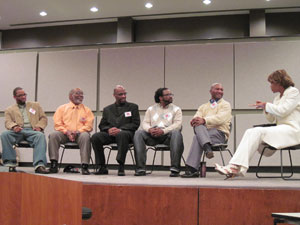News & Events
Black Deaf men triumph over ignorance
Panelists share stories of isolation and discrimination in mainstream schools
Imagine sitting in an elementary classroom for two years hearing nothing and being ignored by your teacher and classmates.
That was the experience of Willie Woodson Jr. who was born with the ability to hear but lost all of is auditory senses by the age of five.
“I was a smart boy – I just couldn’t hear what was going on in class,” said Woodson, one of the five men who shared personal anecdotes in the Feb. 25 on-campus panel discussion “Untold Stories: Black Deaf Men.”
The event was the second in the series launched last year by the American Sign Language Interpreting Program of the Department of Communication Sciences and Disorders.
Organized and moderated by Assistant Professor Sharon G. Hill, the talks provide a public platform for members of a subculture marginalized inside cultural groups with freighted American histories.
Dean John Roberts, who attended the Saturday afternoon forum, described the program as "groundbreaking” in its vision and ability to give voice to that subculture.
Woodson did not start learning to sign until he was age 18. He was raised mostly by his grandmother, who, despite having her formal education ended in the second grade, taught him the value of education and the value of working against the odds.
“I felt the most discrimination from hearing Black people who did not believe a Deaf person could be smarter than them,” Woodson signed.
In 1976, Woodson became the first Deaf person to successfully complete a program at Lamar University. He spearheaded the creation of the Houston chapter of the Black Deaf Advocates and served the organization as a local and national officer. He is planning his retirement from the Texas Health and Human Services after 20 years of service.
The other panelists were:
- Marcus Sylvestor, a graduate of Barbara Jordan High School in Houston, who attended the Rochester Institute of Technology (RIT) and served on the board for the Dean of Student Advisors at the National Technical Institute for the Deaf (NTID).
- John Marcelle, who has been employed as an educator of the Deaf for nearly a decade. He earned his first master's degree in theological studies in 2001 and added to it in 2007 with a master's degree in Deaf Studies & Deaf Education. He is a member of the Speak Gospel Hands choir and also serves as a volunteer interpreter for his church.
- Tyran Lee, the founder of the Deaf Youth Program for the City of El Paso. Currently, he works as an ASL Instructor at Atascocita High School and serves on the Governor's Board for the Texas School of the Deaf in Austin.
- Rodney van Manen, a graduate of the Model Secondary School for the Deaf located on Gallaudet campus in Washington, D.C. He works in the College as an ASLI language tutor.
All had similar stories as Woodson’s about attending school with hearing children and, repeatedly, having to prove that their intelligence was not lessened by the silence that cocoons their lives.
Van Manen’s mother, Mary Lynch van Manen, was in the audience this year instead on the stage. Last year, she was a panelist when the focus of “Untold Stories” was on Black Deaf women. She signed that that the first word her son signed was “milk” but that he could only finger spell the “m” and “k.”
The audience of about 200 included students studying ASL interpreting, professional sign language interpreters and many Deaf people. The Deaf community spells the word with a capital "D" to reflect their immersion in a unique culture that does not view hearing loss as a disability but, rather, embraces it and sets its own values, traditions and norms.
CLASS offers a Bachelor of Arts degree in American Sign Language Interpreting (ASLI) — the first four-year degree in this area offered in the state of Texas. The coursework exposes students to the complexity and cultural nuances of sign language and prepares graduates to sit for national and state certifications in American Sign Language interpreting.
The first cohort to graduate with a BA in sign language interpreting from the university will do so in May, said Dr. Lynn Maher, chair of the Department of Communication Sciences and Disorders.
~ Shannon Buggs






